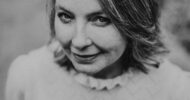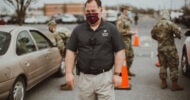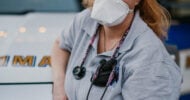Dan died, and I became a writer. I didn’t know it, but I did. Back then, I wrote one story, almost by accident, trying to make sense of my personal chaos. That essay chronicled a small-town doctor losing a beloved middle-aged friend who was rapidly fading from pancreatic cancer. It felt like being dropped into a horrible Lifetime movie come to life, where one day in August 2016, Dan developed stomach pain and was dead before Valentine’s Day 2017. The subject of the story was about Dan, but the writing was, I know now, about me.
A pulsating grief needed, yearned, to come out of me. Until I wrote it on the page, there was a hole in the bottom of me, and I slowly leaked onto the floor. My whole community — church, team, friends, family —was bereft. Dan was funny and kind, intelligent and tough. He sang in the choir, even as he lived as a libertarian, bourbon-drinking lawyer. He was crazy-cool, one of a kind. This made his death even more tragic. I was a friend to Dan’s beautiful kids, and I was lost in the wilderness after we buried him.
While Johns Hopkins University published my story, that’s not why I wrote it. A voice inside me clambered onto the page before I had processed what happened. Or maybe I processed what happened because I took the time to put it on paper.
I just knew how my broken heart throbbed, and, rather than sitting, crying in my office, I tapped on the keys, shaping my sadness into story. I cried while typing, but something felt productive. It’s hard to explain why it made sense.
The earliest draft was a big bowl of word salad. But I eventually separated the leafy greens from the tomatoes and, at the end of my unplanned project, had something you could put balsamic vinegar on and eat. I like salad. I made it for myself and slowly ate the whole thing, one bite at a time, staring at my fork and thinking about it. It made me feel good, but I never thought of writing more. Dan’s essay-as-salad seemed like a one-off, which I made and then put the bowl in the dishwasher. While publication had been unthinkable at first, this piece found its home.
These years later, I understand that I cut my teeth on writing by telling Dan’s story, only I was too busy to notice. My grief for Dan had a long tail, which stretched into 2018, when my mother-in-law Deb died of breast cancer. The death of this beautiful, smiling, caring matriarch left my family adrift again. Deb was the center of the Patthoff solar system. So many family planets orbited around her in celestial harmony — until they didn’t.
If it’s possible, I might have “recovered” from these deaths. I processed grief, loss. Then my life was mauled in 2020 by the charging rhino we called “coronavirus.” And when COVID trampled me, I stopped reflecting on the life I knew, and maybe my psyche and self-esteem were pummeled too. I picked myself off the ground and survived as best I could, navigating the pandemic savannah where rhinos weren’t the only thing hellbent on killing me.
Thankfully, I did not stop writing. It had grown roots deep enough inside me by the pandemic that I carried on. Even though, as I mentioned, I did not think too hard about it. I did not see it as a part of a larger whole. Survival became such an obsession in the pandemic, I did not think about much else. After the pandemic hit and everything changed, I kept writing. But this time, it was a different format and different motivation.
Many small habits define my day. I often flip over to the Notes app on my phone, jotting down workaday items, like a grocery list, a modern working parent ritual. Or, more correctly, I update a list that is in a semi-permanent residence there. During the pandemic, I checked my “Grocery List” as I always did, but there were times I added editorial to the bottom of the list. Under cheddar cheese and panko I might add something like:
Today is horrible.
And, with a simple phrase, writing on a phone, omnipresent in my work day. It was suddenly a place where I jotted down thoughts and observations, spontaneously and without agenda.
This was, it turns out, my second beginning at writing. OK, maybe not full-blown writing, more like word doodles. I was freestyling while sitting in my car. So much of the pandemic experience seemed to be driving to and from work. Sitting in my car, parked outside, waiting for someone or something. It was quiet and calm there, a true respite from my hospital. Mask off, drinking a cup of tea, wondering what the fuck happened to the world I used to know. The confluence of being in the car, holding my phone and being emotionally fragile again set the stage for my next foray into writing.
To borrow from my earlier metaphor, I once again made more salad. But this time, it was more akin to carrot sticks, bite-size pieces. Which, in retrospect, is totally understandable. It helps me understand why this crudité-like writing did not appear on my radar as actual writing, like Dan’s story. It seemed as meaningful, or perhaps meaningless, as the grocery list.
I know now, three years later, the pandemic was different. I was not sitting at my desk; I was subconsciously scrawling on my phone, fighting for survival. My second literary start was a survival journal. Nebulous. Unscripted. Unplanned. Important. And forgotten. How it all came together makes sense now, but, at that time, I did not think about any of these events. Like most physicians, I was facing the next immediate crisis. I forgot a lot of sideshows and diversions, 2020 to present.
COVID felt to me like a bank robbery. I didn’t process the impact during the scariest part. After we handed over our money and the burglars ran out the door, only then could I breathe, cry and express shock. I had a bunch of things written on the phone, but they were unknown to me. I was recording without paying attention. The writing between the two events reflected two different scenarios. Dan’s death was one situation, the pandemic another. The through line? Both events steamrolled me.
But only now the meaning of my writing is becoming clear. As a doctor who worked two straight years in a crisis, constantly ready to cry, with a headache while being asked to reach beyond my capabilities, my emotions oscillated inside of me in an unstable way. I worried it would spiral into calamity. I became convinced that I was going to be a panicked, screaming father and emotionally distant husband. Permanently. It was awful, and I never want to live that way again.
At the time, I did things to ensure I did not tip over into desperate behaviors. I knew I wouldn’t take up smoking to cope. I was very conscious about using alcohol to treat my mood — I stopped doing that long ago. I wouldn’t eat myself into oblivion. I’m an internal medicine doctor, after all. But I was legit worried that my emotions were going to stay jacked-up forever, permanently stuck on alarm mode, just like my nose and my ability to taste, which have been decimated by Wuhan and alpha COVID.
Word doodling on my phone, with humble beginning phrases like, “I have no idea how I’m going to survive this,” were my primal coping mechanism. Trauma (COVID) meets situation (car) meets technology (phone). I could have spent my lunch hour driving through Taco Bell and eating nachos bell grande. Some of my coworkers did, parked right next to me. One thing was obvious to me–the things I should not do to cope with COVID. The right ones weren’t always as clear.
I’m proud of my subconscious self for stepping away from darkness, fumbling towards the light. I’m not going to take credit because, like I said, I am not sure it was a calculated choice. But here we are, and I am writing. Today, I have a broader emotional palate in several meaningful ways. I find myself so much less angry at the world. That was one of the hardest parts of COVID for me, being surrounded by hostility and willful stupidity. It was a nightmare.
At the beginning of 2020, several doctors from my practice retired, leaving me holding the bag, a mature office full of elderly patients looking to me for advice, counsel, support, everything. Even in peacetime, I would have been overwhelmed. In COVID, I looked in my hand, the bag full of cyanide and dynamite. Bad situations appeared everywhere I looked. It’s hard to describe the white-knuckle ride I had in COVID. No wonder I distractedly scribbled things on my phone. I was dealing with madness.
As a man approaching 50 years old, I thought I was done discovering things about myself. But I was wrong. Writing has the shiny-new feeling of teenage romance, a world full of technicolor possibilities. I’m giddy about it. It’s like I plucked the Dragon Scroll from the top of the temple, if you’ve ever seen “Kung-Fu Panda.” It’s genuinely exciting, so much so I want to take my writing and make out with it on the couch.
Writing makes me emotionally lighter and, at the same time, more capable. I am not saying that I figured out everything from the pandemic. Far from it. I am still lost many days. The more I unpack, the more confused I become. It’s like cleaning a closet, only realizing you’ve only moved your junk into the middle of the room.
Through sheer dumb luck, I have plugged myself into an activity that offers the possibility of understanding, the potential to see grace inside this pain cave. So I have to keep writing, keep making salads. Like a bowl of spinach, this is good for me.
My day job requires all of my humanity to be accessible in the exam room. During the pandemic, I gave myself a pass, meaning just slapping together whatever I could was good enough. It was all I could do, and given the circumstances, I stand by it. I give myself full credit for showing up and bailing out the boat, even if I was grumpy, and, many days, testy and angry.
My care of my fellow humans was, in so many ways, merely adequate. If your boat was sinking, would you have smiled and been charming? I don’t know what others would do in that situation. What I do know is that I was a terrified doctor struggling to do the basics in extraordinary circumstances. One human being trying my best. As we say around here, I ain’t ashamed of shit.
But now, A.C. After COVID, I want to, I need to be a doctor — a person who is far beyond just good enough. In this after time, I am adjusting my standards to aim above C+. The way I see it, I have to take the lessons from the pandemic and put them into daily practice, whatever that means.
When I was young and shiny, fresh out of medical school, I had dreams about what my career in medicine could be. I believed I could change the system, and do whatever else was needed. My heart has always been pathetically sincere, and, when I was young, it bounded with eagerness. If I met my younger self on the street today I would roll my eyes at this earnest young man. But, again, I ain’t ashamed. It was who I was, therefore, part of who I am.
But those naïve thoughts have long since vanished, because my dreams were dashed on rocks as my health care ship ran aground. The pandemic taught me, and writing made me see it in black and white — and this is the critical part — who I choose to be inside this system, well that, my friends, is up to me alone.
With the insight gained by writing about my pedestrian life and my epic health care epoch, I now see agency over how I practice, how I am human. This is where I can succeed. This is the potential space to heal. This, if I am honest, is how I can take the pandemic’s awful bag of lemons, and making limoncello out of it. I hope to sip it on the veranda with friends in the sunshine.
This is also where I can fail, succumb to middle-age mediocrity. This is where I can get a C+, thinking I can phone it in. This is how I can believe — wrongly — adequate care is OK now that the pandemic is fading. I am not tempted to claim the pandemic made me damaged goods, a shadow of my former self. So many of my work moments are emotional bank robberies. I don’t process them. Suffice it to say, one of my great skills is going from one to another, day after day in the clinic. That sounds like madness, but this is reality in West Virginia primary care.
One example: telling people they have cancer. Or, they should not get CPR because they are going to die. Or, Grandma had a stroke. Or, your husband is losing his eyesight. Or, your leg needs to be cut off–today. Each of these is a mini-death. Or, more accurately, a grief event. I spend my day traipsing from one moment of pain to another. And I did so for twenty years, without tools to process it all.
Thirty years ago, I heard Mickey Hart, drummer for the Grateful Dead, interviewed by Terry Gross on Fresh Air. Hart described rare times playing with his band, in a crowd, outside, with lights, when he achieved an amazing state of being. He describes a Zen trance where time stops, music, effortless, and he becomes one with the universe, his fellow humans. I know this sounds like hippie drivel, but follow me. When this elusive state happens, Hart describes it as, “drumming at the edge of magic.” Those words–the edge of magic. I don’t know why they stuck with me, but they did. They didn’t make sense at the time, but I remember them.
In subsequent decades I have had experiences that, honestly, are exactly like Mickey Hart’s. I don’t do psychedelics or play in a rock band. I don’t stand in a stadium, rather work at the bedside in a hospital, chairside in my office. This is my performance space. Yet, I have experiences with my patients when the right elements meld and a Zen beyond description emerges. The world stops. My relationship with this person shifts as if a divine moment. It is real. I have felt it. I have seen it. Many times before, but profoundly in the last three years of the pandemic. It is health care at the edge of magic.
Reconnecting to these moments through writing has made this middle-aged man feel naïve again. Open to wonder. This is why I am making out with my new girlfriend: writing. It’s the sexiest development to come my way in a long time. I feel young again, full of hope, believing I still have time to be somebody in my health career. So many of my professional lessons–disappointments, learning to settle for things, coping with grim reality. Writing is an opportunity to process what I’ve seen and, now that I’ve been around the block, offers a way for me to prioritize what I truly care about. In a world where a variety of things clamor for my attention, this newly found skill is profound and precious.
The sheer joy which comes from finally — finally! — processing this epic journey is an act of magic by itself. It’s the lemon juice that reveals the invisible ink of my medical stories. I need to keep writing. I feel a quiet confidence to attend all the ones yet to come.
Ryan McCarthy is an internal medicine physician.




















![Primary care receives only five cents of every health care dollar [PODCAST]](https://kevinmd.com/wp-content/uploads/Design-4-190x100.jpg)


![Physician father wrestles with daughter’s post-Dobbs future [PODCAST]](https://kevinmd.com/wp-content/uploads/Design-1-1-190x100.jpg)
